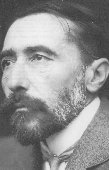
Born: December 3, 1857, Berdichev, Polish enclave in Russia (presently Ukraine)
Died: August 3, 1924, Oswalds, England
Early days. Joseph Conrad was born in Berdichev, in the Ukraine, in a region that had once been a part of Poland but was then under Russian rule. His father Apollo Nalecz Korzeniowski was a nobleman whose estate was sequestrated after anti-Russian rising, a poet and translator of English and French literature. His mother was Ewa Bobrowska also from Polish nobility. As a boy the young Joseph read with his father Polish and French versions of English novels. When Apollo Korzeniowski became embroiled in political activities, he was sent to exile with his family to Vologda, northern Russia, in 1862. By 1869 Conrad's both parents had died of tuberculosis, and he was sent to Switzerland to his maternal uncle Tadeusz Bobrowski. The young boy became the ward of his uncle, who loved him dearly and essentially replaced Apollo.
Conrad leaves Poland; works on ships.Thus began the Cracow years, which ended when Conrad left Poland in 1874. It was a complex decision, resulting from what he saw as the intolerably oppressive atmosphere of the Russian garrison. He spent 1875-77 in France and on French ships, mastering his second language and the fundamentals of seamanship. The author made acquaintances in many circles, but it was his so-called "bohemian" friends who introduced him to drama, opera and theatre. In the meantime, he was strengthening his maritime contacts, and soon enough he became an observer on pilot boats. The workers he met on the ship, and all the experiences they thrusted upon him, laid the groundwork for much of the vivid detail in his novels. During 1877 Conrad also was involved in arms smuggling for the Carlist cause in Spain.
Arrives to England.By 1878, Joseph had made his way to England with the intention of becoming an officer of the British ships.
After being wounded by a self-inflicted gunshot in the chest, Conrad continued his career at the seas for 16 years in the British merchant navy. Conrad rose through the ranks from a common seaman to the first mate, and by 1886 he obtained his master mariner's certificate, and commanded his own ship, Otago. In the same year he was given British citizenship and he changed officially his name to Joseph Conrad. Conrad sailed to many parts of the world, including Australia, various ports of the Indian Ocean, Borneo, the Malay states, South America, and the South Pacific Island. In 1890 he visited Poland and he also sailed in Africa up the Congo River.
Begins writing. By 1894 Conrad's sea life was over. During the long journeys he had started to write and decided to devote himself entirely to literature. In 1893 Conrad settled down in England. On his death in 1894 his uncle Bobrowski left him about £1,600 to - well over £100,000 now.
Marriage.In 1896 Conrad married Jessie George, an Englishwoman, by whom he had two sons. The family moved to Ashford, Kent.
Novels.His first novel, ALMAYER'S FOLLY, appeared in 1895. It was followed by AN OUTCAST OF THE ISLANDS (1896). In his famous preface to THE NIGGER OF THE 'NARCISSUS' (1897) Conrad crystallized his often quoted goal as a writer: "My task which I am trying to achieve is, by the power of the written word, to make you hear, to make you feel - it is, above all, to make you see. That - and no more, and it is everything." LORD JIM was originally intended as a short story, but was then enlarged into a novel. The book was written in 1899 and published in 1902. In 1904 he wrote NOSTROMO.
The period between THE NIGGER OF THE ‘NARCISSUS’ and UNDER WESTERN EYES (1911) is considered artistically Conrad's most productive. H.G. Wells encouraged Conrad and gave him good reviews and his work was also recognized by John Galsworthy. Although Conrad was prolific, his financial situation wasn't secure until 1913 with the publication of CHANCE. HEART OF DARKNESS was partly based on Conrad's journey up the Congo River some 12 years earlier.
Visits to Poland.Refusal of honors.In 1914 he went to Zakopane (Austria occupied Poland) where he met Stefan Zeromski. He visited Poland again in 1924. Conrad refused an offer of knighthood in 1924 as he had earlier declined honorary degrees from five universities. He died of a heart attack on August 3, 1924 and was buried in Canterbury.
Influence on 20th century literature.Conrad's influence upon 20th-century literature was wide. Ernest Hemingway expressed special admiration for the author, and his impact is seen in the work – among others - of F. Scott Fitzgerald, Arthur Koestler, T.S. Eliot, Marcel Proust, André Malraux, Louis-Ferdiand Céline, Jean-Paul Sartre, and Graham Greene. Several of Conrad's stories have been filmed. The most famous adaptations are Alfred Hitchcock's The Sabotage (1936), based on THE SECRET AGENT (1097), Richard Brooks's Lord Jim (1964) and Francis Ford Coppola's Apocalypse Now (1979), based on HEART OF DARKNESS. NOSTROMO was shown on Public Broadcasting System (USA).
This short biography is based primarly on the work by Petri Liukkonen who gave me permission to use it:
Liukkonen
Other sources include:
ClassicNotes: Joseph Conrad
The Literature Network;online books: Heart of Darkness,Lord Jim, Nostromo, The Secret Agent, Typhoon; short stories
Joseph Conrad Foundation
Return to home page:
Prominent Poles